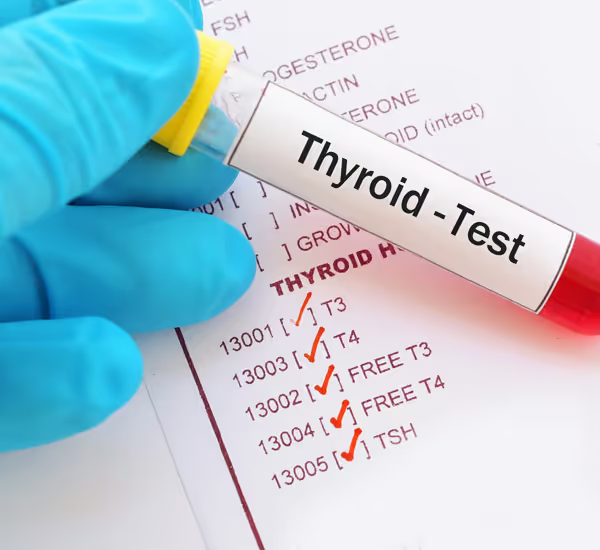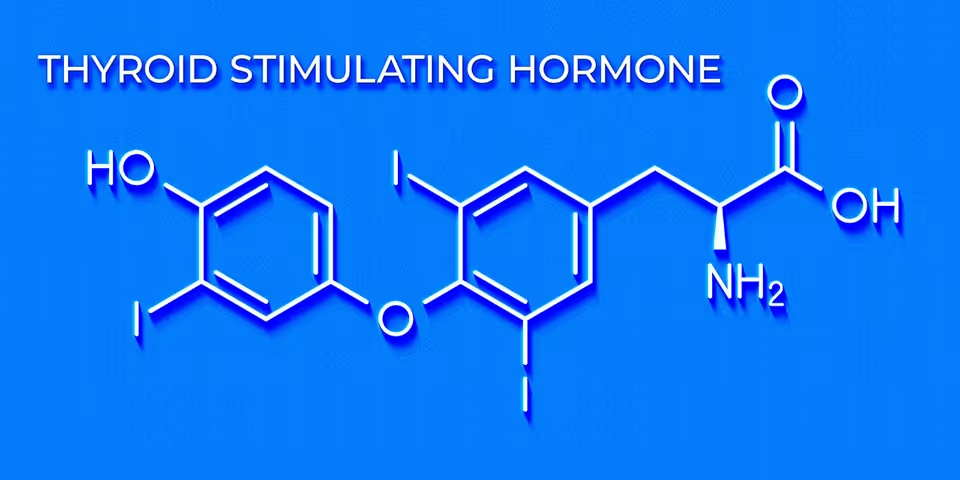Thyroid Stimulating Hormone Test (TSH)
Feeling tired, gaining weight, or just not quite right? It could be your thyroid. A TSH test (thyroid-stimulating hormone test) is a simple blood test that checks how well your thyroid is working, and it could explain a lot. In this article, we’ll cover what the TSH blood test involves, why it matters, how to prepare, and what your results mean. At Everlab, we include the TSH test in our full diagnostic workup to help you catch issues early and stay in control of your health.

TSH Blood Test, Book Thyroid Stimulating Test in Australia Today
What:
Blood biomarker
Tests for:
Hyperthyroidism and hypothyroidism
Referral:
Required
Member cost:
$40-$60
What Is a TSH Test?

A TSH test, short for thyroid-stimulating hormone test, is a common blood test used to evaluate how well your thyroid gland is working. The TSH test is part of evaluating the endocrine system, which is the network of glands and hormones that regulate body functions. It measures the amount of TSH, a hormone made in your brain by the pituitary gland that tells your thyroid what to do. The pituitary gland makes TSH.
The thyroid gland controls the speed of your metabolism, impacting energy levels, heart rate, weight, mood, and more. When TSH levels are off, it usually signals that your thyroid is either underactive (hypothyroidism) or overactive (hyperthyroidism).
TSH doesn’t act alone. It’s part of the hypothalamic-pituitary-thyroid (HPT) axis, a hormone feedback loop that helps your body maintain balance. TSH stands for thyroid-stimulating hormone (TSH), and it plays a key role in the endocrine system by regulating thyroid function through signals from the pituitary gland.
Why Is TSH So Important?
Your thyroid is a tiny gland with a huge job—it controls how fast your body turns food into energy. If it’s not working properly, you can feel it in every system. The thyroid influences many essential body functions, such as metabolism, heart rate, and mood.
TSH Reflects Thyroid Health
TSH is your body’s thermostat for thyroid function. High TSH often means your thyroid is underactive (not making enough hormone), also known as an underactive thyroid (hypothyroidism). Low TSH suggests it may be overactive, or an overactive thyroid (hyperthyroidism).
By measuring TSH, doctors can assess whether your thyroid is:
- In balance (euthyroid)
- Underactive thyroid (hypothyroidism)
- Overactive thyroid (hyperthyroidism)
- Being affected by another condition
Abnormal TSH levels may indicate a thyroid problem or thyroid disorder, which requires further investigation.
Why Test Your TSH Levels?
In Australia, thyroid conditions are extremely common, especially among women over 40. Yet many people walk around undiagnosed for years because symptoms are vague and easily dismissed.
Testing TSH can help:
- Explain persistent symptoms like fatigue, weight gain, cold sensitivity, or hair thinning
- Detect subclinical thyroid issues before full-blown disease
- Assess your risk of autoimmune thyroid disease
- Guide treatment in people already diagnosed with thyroid issues
- Identify thyroid problems early to prevent more serious health problems
At Everlab, we include the TSH test in our diagnostic panel because thyroid dysfunction is often silent, slow-moving, and missed by standard check-ups. Blood tests, including TSH, are essential for detecting thyroid problems before they cause significant health problems.
What Affects TSH Levels?
TSH can fluctuate based on several factors. TSH levels can also vary slightly depending on factors such as age, time of day, and physiological states.
- Stress and illness
- Pregnancy
- Medications
- Hormonal changes can also affect body temperature and blood pressure, both of which are regulated by the endocrine system.
Hormonal Changes
- Pregnancy naturally alters TSH and thyroid hormone levels. TSH levels are monitored throughout pregnancy, including the third trimester, as levels can change during this period.
- Menopause can affect thyroid output and how your body responds.
Stress
Cortisol (your stress hormone) interacts with the thyroid axis, sometimes suppressing TSH temporarily.
Sleep and Circadian Rhythm
TSH has a diurnal pattern, meaning it’s higher at night and lower in the morning. Poor sleep can throw it off.
Diet and Nutrients
Low levels of iodine, selenium, or zinc can impair thyroid function. Over-supplementation, especially iodine, can also disrupt it.
How Is a TSH Blood Test Performed?

The test itself is simple:
- No fasting required (unlike glucose or cholesterol tests).
- A small blood sample is drawn from your arm.
- TSH levels are measured in milliunits per litre (mU/L).
TSH is one of several thyroid function tests used to assess thyroid health. In most cases, doctors will also check your T3 and T4 levels—thyroid hormones that TSH regulates—as part of a group of thyroid tests. Other thyroid tests, such as free T3, free T4, reverse T3, and anti-TPO antibody tests, may be ordered for a comprehensive assessment.
Pathology tests, including TSH, T3, and T4, are used to diagnose thyroid problems. For more details, see the section 'Pathology Tests Explained'. Test results from these blood tests help guide diagnosis and treatment.
How to Prepare for a TSH Test
TSH testing is relatively low-prep, but a few tips help improve accuracy:
- Avoid biotin supplements (commonly found in hair/nail products) for 48 hours—they can interfere with lab results.
- Test in the morning if possible, as levels fluctuate slightly during the day.
- Let your provider know if you're on thyroid medication or hormone therapy.
What’s a Normal TSH Level?

Australian Reference Ranges
The typical TSH range in Australia is:
- 0.5 – 2.5 mU/L (depending on the lab)
When to Be Concerned
- >4 mU/L: TSH test results above 4 mU/L may indicate hypothyroidism.
- < 0.4 mU/L: TSH test results below 0.4 mU/L may indicate hyperthyroidism or suppressed TSH from medication.
Pregnancy Adjustments
During pregnancy, normal ranges shift—TSH is often lower in the first trimester and monitored closely throughout gestation.
How TSH Relates to Long-Term Health
A chronically high or low TSH can lead to serious complications if untreated. Having too much thyroid hormone or too little thyroid hormone can disrupt many body systems.
Monitoring how much thyroid hormone is present in the blood, and whether the body has enough thyroid hormone or enough thyroid hormone, is essential for long-term health.
Elevated TSH (Hypothyroidism)
- Fatigue, depression, cold intolerance
- Weight gain, constipation
- Fertility issues
- High cholesterol and cardiovascular risk
Congenital hypothyroidism is a condition detected in newborns through TSH testing, and early treatment is crucial.
Low TSH (Hyperthyroidism)
- Anxiety, insomnia, and heat intolerance
- Unintentional weight loss
- Palpitations and increased stroke risk
- Osteoporosis in older adults
Hyperthyroidism is caused by too much thyroid hormone in the body, which can accelerate many bodily functions and result in low TSH levels.
Graves' disease is a common cause of hyperthyroidism, leading to the overproduction of thyroid hormones and low TSH levels.
Over time, both extremes can lead to serious systemic effects, especially on the heart, brain, and metabolism. That’s why proactive monitoring is critical.
Risks and Limitations of the TSH Test
The TSH test is useful but not perfect. If TSH results are abnormal, other tests may be needed to diagnose conditions such as thyroid cancer or to assess for thyroid nodules and other thyroid disorders.
TSH alone doesn’t reveal how much active thyroid hormone (T3 and T4) is circulating or how well your tissues are using it.
Some people feel unwell with a “normal” TSH but low T3. That’s why comprehensive testing is essential.
How to Improve TSH Results Naturally
If your TSH is out of range (but not dangerously so), there are science-backed steps you can take:
For those taking thyroid hormone medicine, regular TSH testing is important to ensure the correct dosage is maintained.
Eat for Thyroid Health
- Iodine – Found in seaweed, iodised salt, eggs
- Selenium – Brazil nuts, tuna, mushrooms
- Zinc – Oysters, beef, pumpkin seeds
- Tyrosine – An amino acid found in meats and dairy
Reduce Inflammation
Autoimmune thyroid disease (like Hashimoto’s) is a common cause of TSH imbalance. Supporting your gut, managing stress, and reducing inflammatory foods may help stabilise your levels.
Get Regular, Restorative Sleep
Sleep helps regulate all hormonal systems, including your HPT axis.
Review Your Medications
Some medications (e.g., steroids, dopamine agonists, and lithium) can affect thyroid function. Don’t stop them on your own—work with a doctor.
TSH Test Cost in Australia
The TSH test cost in Australia varies depending on how it’s ordered:
- Bulk-billed through Medicare if ordered by your GP with a valid reason.
- Private labs typically charge $30–$50 if no Medicare rebate applies.
If you’re tired of one-off tests with no explanation, we go several steps further by interpreting your thyroid function in context, across sleep, stress, nutrition, and hormones.
When Should You Re-Test TSH?
General Guidelines
- Every 6–12 months, if you’re borderline or on thyroid medication
- Every trimester, if you’re pregnant
- Every 6 months, if you’re making lifestyle changes
Sources
1. Australian Thyroid Foundation - Thyroid Facts
https://www.thyroidfoundation.org.au/Understanding-the-Thyroid
2. Pathology Tests Explained - Thyroid Function Tests
https://pathologytestsexplained.org.au/ptests.php?q=Thyroid+function+tests
3. American Thyroid Association - Thyroid Patient Information
https://www.thyroid.org/thyroid-information/
4. Medscape - Thyroid-Stimulating Hormone
https://emedicine.medscape.com/article/2074091-overview?form=fpf
Get On Top Of Your TSH Levels
Your thyroid can affect everything from your weight to your mood to your energy—and it can fall out of balance for years before symptoms scream for help. A TSH blood test is a simple but powerful step in understanding what’s going on beneath the surface. But it’s even more powerful when combined with a full picture of your health.
.avif)


imaging

biomarkers

sterols
Book a Free Discovery Call
Join 20,000+ Australians improving their health with proactive, personalised healthcare.